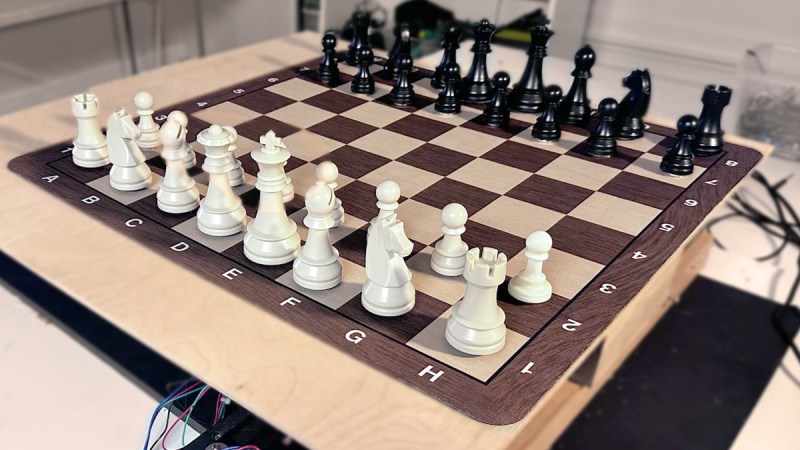Chess is timeless, but automating it? That’s where the real magic begins. Enter [Tamerlan Goglichidze]’s Pi Board, an automated chess system that blends modern tech with age-old strategy. Inspired by Harry Potter’s moving chessboard and the commercial Square Off board, [Tamerlan] re-imagines the concept using a Raspberry Pi, stepper motors, and some clever engineering. It’s not just about moving pieces — it’s about doing so with precision and flair.
At its core, the Pi Board employs an XY stepper motor grid coupled with magnets to glide chess pieces across the board. While electromagnets seemed like a promising start, [Tamerlan] found them impractical due to overheating and polarity-switching issues. Enter servo linear actuators: efficient, precise, and perfect for the job.
But the innovation doesn’t stop there. A custom algorithm maps the 8×8 chess grid, allowing motors to track positions dynamically—no tedious resets required. Knight movements and castling? Handled with creative coding that keeps gameplay seamless. [Tamerlan] explains it all in his sleekly designed build log.
Though it hasn’t been long since we featured a Pi-powered LED chess board, we feel that [Tamerlan]’s build stands out for its ingenuity and optimization. For those still curious, we have a treasure trove of over fifty chess-themed articles from the last decade. So snuggle up during these cold winter months and read up on these evergreens!
















I was hoping for the same thing I always hope for with these builds, namely a bank of capacitors to fire captured pieces clean through the upstairs apartment.
But if you can forgive that disappointment, it’s a nice build. This is something where it’s easy to come up with overengineered answers for millionaires, but there’s real art in doing it economically.
Are you open to testing it in Kenya? If so please contact me on my email; address: okellojoluoch@gmail.com
i imagine the version of this that has the finesse to reposition the pieces it inevitably dislodges as it slides along a diagonal or as a knight between pieces.
but as a human player, i definitely nudge pieces out of position, and then correct them. hah and as someone who plays against a human opponent, i occasionally correct the position of his pieces that he disrupted, too! so that was really probably the most natural part of the video for me heh
How does the device know what move the human made? I see no sensors, and didn’t see it in the project description.
Magic!
Looks like the human player keys in his move after moving the piece.
The vast majority of chess robots I’ve seen (DIY and commercial) have been ‘hidden moving arm’ types, where some mechanism moves a magnet under the board, that drags pieces around. I have yet to see one that uses the board itself for locomotion, layering a PCB coil array under the printed squares and operating the whole thing as a 2D stepper. e.g. https://hackaday.com/2022/02/03/pcb-stepper-motor-micro-robots/